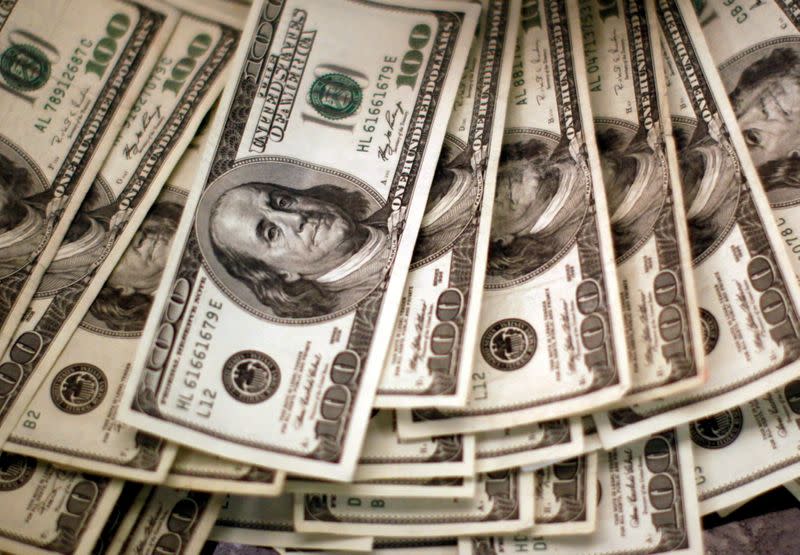Sustainable finance scramble reaches currency derivatives market
By Tommy Wilkes
LONDON (Reuters) - A rush by companies to boost their sustainability claims has reached foreign exchange markets in the form of currency hedging products where the cost is tied to a firm's environmental, social and governance (ESG) goals.
Sustainable finance to date has mostly centred around the issuance of debt to fund 'green' environmental or climate-related projects, or with interest payments linked to the achievement of social and governance targets.
But energy firms Drax and Italy's Enel are among those to have recently signed up to ESG-linked FX derivatives, the price of which depends on anything from cutting greenhouse emissions to improving workforce diversity.
Keen to promote their own sustainability pledges, banks selling the derivatives, which lock in a future exchange rate, tout them as a way for companies to tap into demand for ESG finance, a market that has soared in popularity but which critics say is often more marketing gimmick than a true incentive for change.
Early adopter Olam, a commodity trader, last year bought a U.S. dollar/Thai baht forward contract at a discount to a conventional forward, on condition it meets several targets including cutting carbon emissions and boosting farmer training.
How a value is assigned to an ESG goal, and hence how such products are priced, for now remains between banks and their clients in the fledgling market, but Fabio Madar, global head of FX sales and structuring at NatWest Markets, said there can be decent financial gains for clients that buy and sell currencies frequently.
He cited the example of a company purchasing 400 million euros. If the euro/dollar swap rate was set at $1.2130, the client could lock in a price of $1.2128 if targets are met -- saving $80,000.
The impetus is not just financial, he said, with firms keen "to show that it's not all talk and that the company is real about (sustainability)".
QUANTIFIABLE TARGETS
Jeremy Hamon, head of group finance at engineering business Primetals Technologies, thought sustainability-linked finance was limited to debt products such as those issued by Primetals' parent company Mitsubishi Heavy Industries.
But Primetals developed a framework with Deutsche Bank around its day-to-day currency hedging needs using "quantifiable" ESG targets, including increasing the proportion of revenue from projects that aim to cut greenhouse emissions, and promoting a "safe and healthy work environment".
If it misses the targets -- which are verified by a third party -- Primetals pays a penalty to a charity. It has already bought such options in more than 10 currency pairs.
"This represented all the FX options we have traded in 2021 since the ESG incentive pretty much ensures a strong competitiveness," Hamon said.
UK energy firm Drax has signed ESG-linked derivative deals with Barclays and NatWest, whereby it is paid a premium by the banks for meeting a carbon intensity reduction target.
"Most of our banking group, and even some banks not in our group, have contacted us to see how they can do something similar in the FX and financial derivative space," said Lisa Dukes, Drax's director of corporate finance and derivatives.
GREEN OR GIMMICK?
Sustainable finance has its critics who say it is too loosely-defined, with many products little more than marketing tools prone to so-called greenwashing where environmental claims don't stack up.
Banks insist targets in the ESG-linked derivatives are ambitious, measurable and independently verified.
"These structures are a very good way for a company that doesn't have a funding or capex need related to ESG, to still make a commitment to ESG," said Claire Coustar, Deutsche Bank's global head of ESG for fixed income and currencies.
Mimi Rushton, Barclays' co-head of global FX sales believes ESG incentives could start "extrapolating out to a number of other financial instruments" beyond FX.
One challenge is that banks must bear the cost of the premium or the discount -- the company's reward for hitting targets -- eroding its profit and limiting the size of incentives.
Market growth therefore hinges on such derivatives becoming tradeable. For that, banks must find a way to embed sustainability performance into the option.
One possibility is for ESG targets to be quantified through a regulatory-approved scoring system.
"We may be able to transfer "ESG points" from one entity to another. With this shift, banks would be able to price ESG linked products differently," said Max Poulin from Deutsche Bank's FX structuring team.
"We are still quite far away from that."
(Editing by Sujata Rao, Kirsten Donovan)





